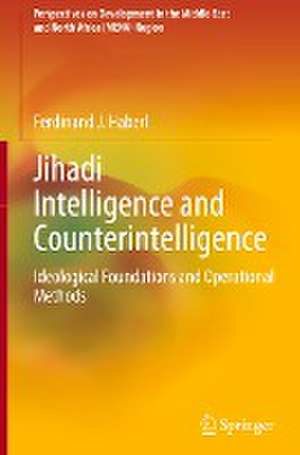Jihadi Intelligence and Counterintelligence: Ideological Foundations and Operational Methods: Perspectives on Development in the Middle East and North Africa (MENA) Region
Autor Ferdinand J. Haberlen Limba Engleză Hardback – 23 mar 2023
| Toate formatele și edițiile | Preț | Express |
|---|---|---|
| Paperback (1) | 685.86 lei 38-44 zile | |
| Springer Nature Switzerland – 24 mar 2024 | 685.86 lei 38-44 zile | |
| Hardback (1) | 788.90 lei 43-57 zile | |
| Springer Nature Switzerland – 23 mar 2023 | 788.90 lei 43-57 zile |
Din seria Perspectives on Development in the Middle East and North Africa (MENA) Region
-
 Preț: 308.70 lei
Preț: 308.70 lei - 15%
 Preț: 642.03 lei
Preț: 642.03 lei - 18%
 Preț: 951.91 lei
Preț: 951.91 lei - 15%
 Preț: 651.02 lei
Preț: 651.02 lei - 15%
 Preț: 645.47 lei
Preț: 645.47 lei - 15%
 Preț: 636.12 lei
Preț: 636.12 lei - 15%
 Preț: 588.50 lei
Preț: 588.50 lei - 15%
 Preț: 635.47 lei
Preț: 635.47 lei - 15%
 Preț: 638.24 lei
Preț: 638.24 lei - 15%
 Preț: 636.94 lei
Preț: 636.94 lei - 24%
 Preț: 691.22 lei
Preț: 691.22 lei - 18%
 Preț: 777.20 lei
Preț: 777.20 lei - 18%
 Preț: 780.82 lei
Preț: 780.82 lei - 18%
 Preț: 938.66 lei
Preț: 938.66 lei - 15%
 Preț: 691.12 lei
Preț: 691.12 lei - 18%
 Preț: 780.82 lei
Preț: 780.82 lei - 18%
 Preț: 1228.77 lei
Preț: 1228.77 lei - 18%
 Preț: 783.68 lei
Preț: 783.68 lei -
 Preț: 386.81 lei
Preț: 386.81 lei
Preț: 788.90 lei
Preț vechi: 962.06 lei
-18% Nou
Puncte Express: 1183
Preț estimativ în valută:
151.00€ • 164.08$ • 126.93£
151.00€ • 164.08$ • 126.93£
Carte tipărită la comandă
Livrare economică 21 aprilie-05 mai
Preluare comenzi: 021 569.72.76
Specificații
ISBN-13: 9783031247439
ISBN-10: 3031247434
Pagini: 318
Ilustrații: XI, 318 p. 7 illus., 2 illus. in color.
Dimensiuni: 155 x 235 mm
Greutate: 0.64 kg
Ediția:2023
Editura: Springer Nature Switzerland
Colecția Springer
Seria Perspectives on Development in the Middle East and North Africa (MENA) Region
Locul publicării:Cham, Switzerland
ISBN-10: 3031247434
Pagini: 318
Ilustrații: XI, 318 p. 7 illus., 2 illus. in color.
Dimensiuni: 155 x 235 mm
Greutate: 0.64 kg
Ediția:2023
Editura: Springer Nature Switzerland
Colecția Springer
Seria Perspectives on Development in the Middle East and North Africa (MENA) Region
Locul publicării:Cham, Switzerland
Cuprins
Glossary of Terms.- Introduction.- Strategic Intelligence Background.- Collection Sources.- Intelligence Analysis and “Lessons Learned”.- The Three Levels of Jihādi Warfare – The Interrelation of Jihādi Operational Art and Jihādi Intelligence.- The “Urtext” of Jihādi Intelligence Culture.- The First Islamic State and its Intelligence Services.- Jihādi Intelligence and Epistemology.- Counterintelligence.- Encryption and Secret Communication Counterfeiting.- Safe Houses.- Covert Operations.- Economic Warfare and Destabilisation.- The Elimination of the Greyzone as a Jihādi Covert Operation.- Jihādi Intelligence Activities in the Digital Realm.- Conclusion.- Bibliography.
Notă biografică
Ferdinand J. Haberl is an Austrian Orientalist with a research focus on terrorism and security, jihadi ideology, terrorist armament culture, improvised firearms and paramilitary intelligence. In his present capacity he acts as the deputy director of the Vienna-based Documentation Center and oversees academic research projects on religiously motivated extremism and terrorism.
Textul de pe ultima copertă
This book analyzes the ideological roots, structures and operational methods of Jihadi intelligence and counterintelligence activities. Based on a substantive collection of data on terrorist attacks, communication channels, recruitment methods, manuals and statements released by various Jihadi groups, it examines and compares the nature, ideology and realities of Jihadi intelligence operations. The author, an expert on Jihadist ideology and paramilitary intelligence, compares the modus operandi of terrorist groups such as al-Qaeda and the IS with those of governmental intelligence agencies, and subsequently analyzes the role of historical and religious narratives that help Jihadist groups justify their actions and military management. Further topics covered include encryption, counterfeiting, covert operations and Jihadi intelligence activities in the digital realm. The insights shared here will allow readers to gain a comprehensive understanding of Jihadist groups and their intelligence operations, while helping practitioners and policymakers develop better counterterrorism activities and counternarratives.
Caracteristici
Examines the ideological roots, structures and operational methods of Jihadi intelligence Analyzes the role of ideological and religious narratives Develops better counterterrorism measures
